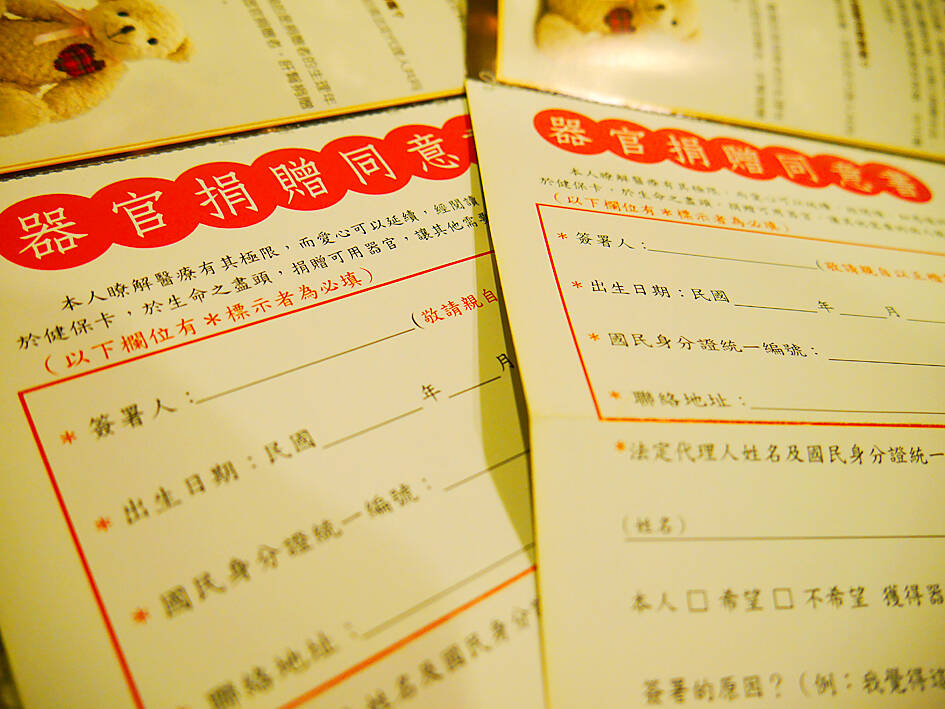The Taiwan Organ Sharing Registry and Patient Autonomy Promotion Center on Thursday denied allegations that an organ donation surgery at an unnamed hospital was illegal.
The hospital received a patient who, while in a critical state, was still connected to an extracorporeal membrane oxygenation (ECMO) machine when the hospital brought in prosecutors to examine the patient, a source said.
This violated due procedure of ascertaining if the patient was clinically dead, saying that it strayed close to organ harvesting, the source added.

Photo: Lin Hui-chin, Taipei Times
The patient was a young male who was hospitalized after an accident, center president Lee Ming-che (李明哲) said, adding that he did not have a heartbeat when he was brought in.
While the man was resuscitated, his condition was unstable, and he had dilated pupils, a symptom of an arterial rupture, and suffered from pericardial effusion, Lee said.
The man was in a deep coma and was close to brain death, while his blood pressure was kept stable only through the connection to the ECMO machine, Lee said.
The man’s family had stated their wish not to prolong his suffering and wanted him to have a dignified death, Lee said.
The hospital regarded the possibility of recovery as slim and that it was difficult for the patient to achieve the legal definition of brain death, Lee said, adding that it had communicated with the family and obtained written agreement to initiate donation after cardiac death (DCD) procedures.
Under Taiwanese law, one can only be considered brain dead if they were on life support for a full 12 hours.
Once the hospital completed the organ donation procedures, it contacted the Taoyuan District Prosecutors’ Office to dispatch a prosecutor and coroner to examine the patient.
According to Article 218 of the Code of Criminal Procedure (刑事訴訟法), if a person dies or is suspected of dying from an unnatural cause, “the public prosecutor having competent jurisdiction shall immediately examine him.”
Following the coroner’s examination and the prosecutor ascertaining that the man’s family had signed the organ donation document of their own volition and that they were aware of what the DCD process entailed, the hospital commenced with the process and disconnected the patient from the ECMO, Lee said.
The doctors waited the required five minutes and, after ascertaining that his heart did not start beating again, officially pronounced the man clinically dead, which was corroborated by an examination by the coroner, Lee said.
The operation followed procedure and could not be faulted in terms of medical practice, law or ethics, Lee said.
However, the center would convene with experts to discuss how to overcome the slight disconnect that such procedures experienced between the medical and legal departments, Lee added.

The Coast Guard Administration (CGA) yesterday said it had deployed patrol vessels to expel a China Coast Guard ship and a Chinese fishing boat near Pratas Island (Dongsha Island, 東沙群島) in the South China Sea. The China Coast Guard vessel was 28 nautical miles (52km) northeast of Pratas at 6:15am on Thursday, approaching the island’s restricted waters, which extend 24 nautical miles from its shoreline, the CGA’s Dongsha-Nansha Branch said in a statement. The Tainan, a 2,000-tonne cutter, was deployed by the CGA to shadow the Chinese ship, which left the area at 2:39pm on Friday, the statement said. At 6:31pm on Friday,

The Chinese People’s Liberation Army Navy’s (PLAN) third aircraft carrier, the Fujian, would pose a steep challenge to Taiwan’s ability to defend itself against a full-scale invasion, a defense expert said yesterday. Institute of National Defense and Security Research analyst Chieh Chung (揭仲) made the comment hours after the PLAN confirmed the carrier recently passed through the Taiwan Strait to conduct “scientific research tests and training missions” in the South China Sea. China has two carriers in operation — the Liaoning and the Shandong — with the Fujian undergoing sea trials. Although the PLAN needs time to train the Fujian’s air wing and

Taiwanese celebrities Hank Chen (陳漢典) and Lulu Huang (黃路梓茵) announced yesterday that they are planning to marry. Huang announced and posted photos of their engagement to her social media pages yesterday morning, joking that the pair were not just doing marketing for a new show, but “really getting married.” “We’ve decided to spend all of our future happy and hilarious moments together,” she wrote. The announcement, which was later confirmed by the talent agency they share, appeared to come as a surprise even to those around them, with veteran TV host Jacky Wu (吳宗憲) saying he was “totally taken aback” by the news. Huang,

The American Institute in Taiwan (AIT) put Taiwan in danger, Ma Ying-jeou Foundation director Hsiao Hsu-tsen (蕭旭岑) said yesterday, hours after the de facto US embassy said that Beijing had misinterpreted World War II-era documents to isolate Taiwan. The AIT’s comments harmed the Republic of China’s (ROC) national interests and contradicted a part of the “six assurances” stipulating that the US would not change its official position on Taiwan’s sovereignty, Hsiao said. The “six assurances,” which were given by then-US president Ronald Reagan to Taiwan in 1982, say that Washington would not set a date for ending arm sales to Taiwan, consult